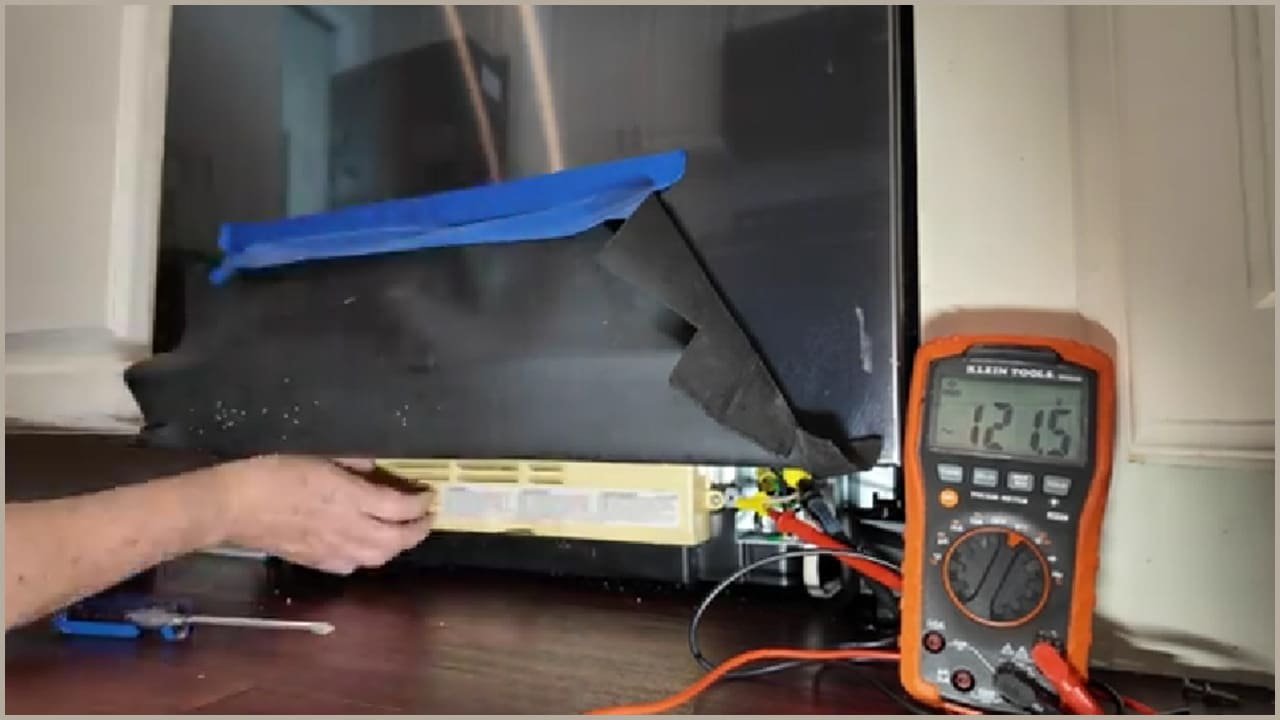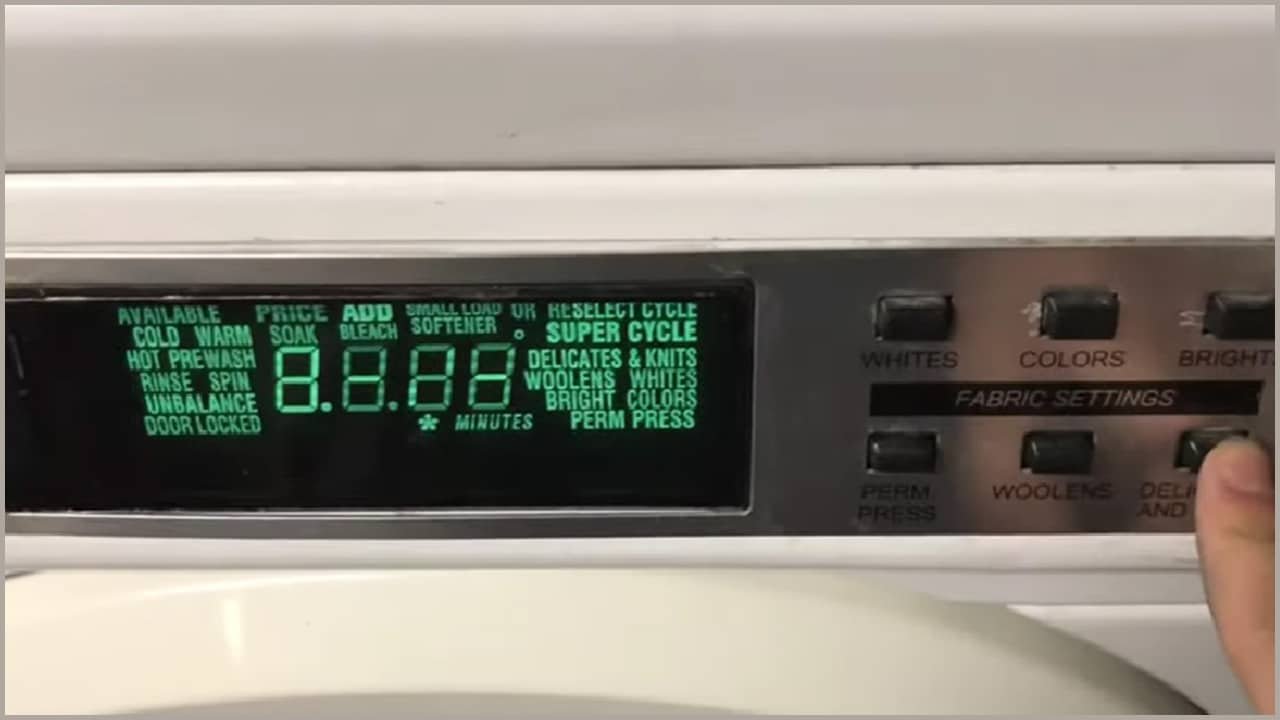If you own a Bosch dishwasher, you might encounter some common issues that can disrupt your daily routine. From water leaks to poor cleaning performance, these problems can often be frustrating. Being aware of typical Bosch dishwasher problems and how to fix them can save you time and money.
Understanding these issues will help you troubleshoot effectively before calling for service. For instance, if your dishwasher isn’t draining properly, you may just need to check for clogs. Learning to recognize these signs early can lead to quick fixes that keep your appliance running smoothly.
In this article, you will discover practical solutions for common Bosch dishwasher problems, including how to address issues like insufficient drying or unusual noises. By the end, you’ll have the knowledge needed to tackle these challenges confidently.
Table of Contents
Common Bosch Dishwasher Issues
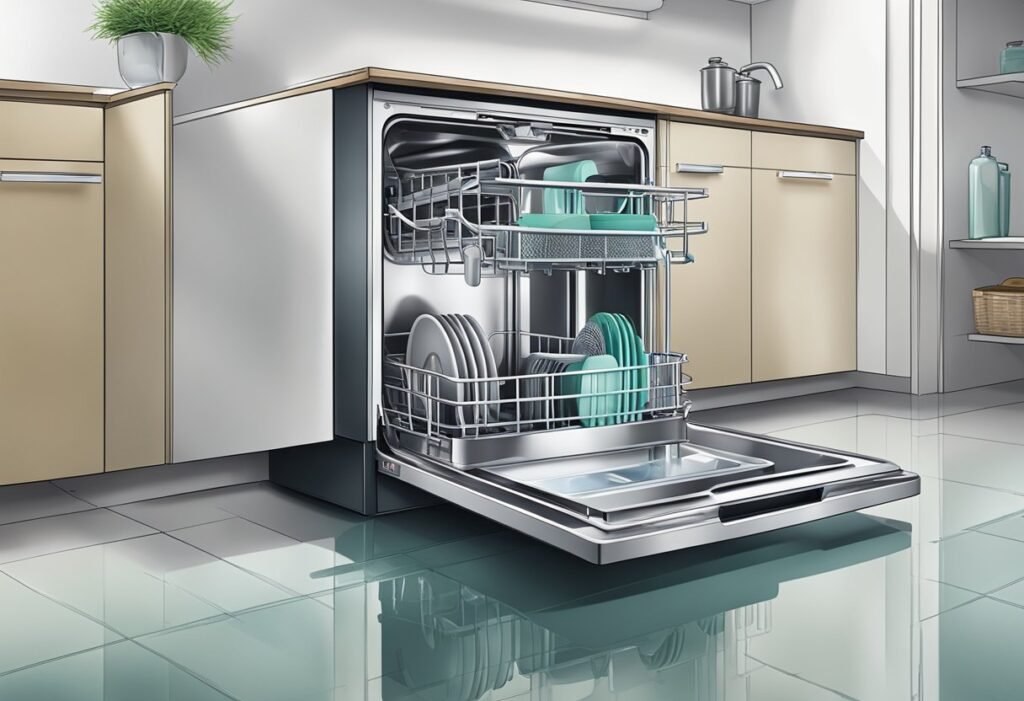
Bosch dishwashers are designed for efficiency, but you may encounter a few common issues. Knowing these problems can help you troubleshoot effectively and maintain your appliance.
Start-Up Problems
If your Bosch dishwasher won’t start, it could be due to several factors. First, check if the door is properly closed. The dishwasher will not operate if the door latch is not engaged.
Also, confirm that your unit is plugged in. A loose or disconnected power cord can stop it from starting. Another common issue is a blown fuse or tripped circuit breaker. Resetting the breaker or replacing the fuse may resolve the problem.
Lastly, observe any error codes on the display. Consult your user manual for specific codes that indicate a particular problem.
Drainage Failures
Poor drainage can lead to standing water inside your dishwasher. A common cause is a clogged filter or drain hose. Regularly cleaning the filter can prevent blockages.
Also, check the drain hose for kinks or obstructions. Ensure it is installed correctly; a too high or low hose can cause drainage issues.
In some cases, the dishwasher’s sump pump may be faulty. If cleaning and inspecting do not resolve the issue, you may need to have the pump checked or replaced by a qualified technician.
Washing and Drying Inefficiencies
If your dishes are not clean after a wash cycle, several factors may contribute to this inefficiency. First, ensure that you do not overload the dishwasher, as this can hinder water flow.
Secondly, check the spray arms for blockages. Debris can prevent them from rotating freely. Clean any obstructions and make sure they are properly attached.
Inadequate drying can also be a concern. If your dishes remain wet at the end of the cycle, your heating element may not be functioning. Testing the heating element with a multimeter can help determine if it needs replacement.
Unusual Noises
Strange noises during operation can indicate underlying issues. Rattling sounds often arise from loose items. Ensure that all dishes are secured and that no utensils are blocking the spray arms.
If you hear grinding or humming noises, it may be a motor problem. This could be due to a malfunctioning motor or a foreign object lodged in the impeller.
Lastly, observe if there are any leaks. Water dripping or pooling suggests a problem with the door seal or the water inlet valve. Inspecting these areas will help identify the source of unusual noises.
Troubleshooting and Diagnostics
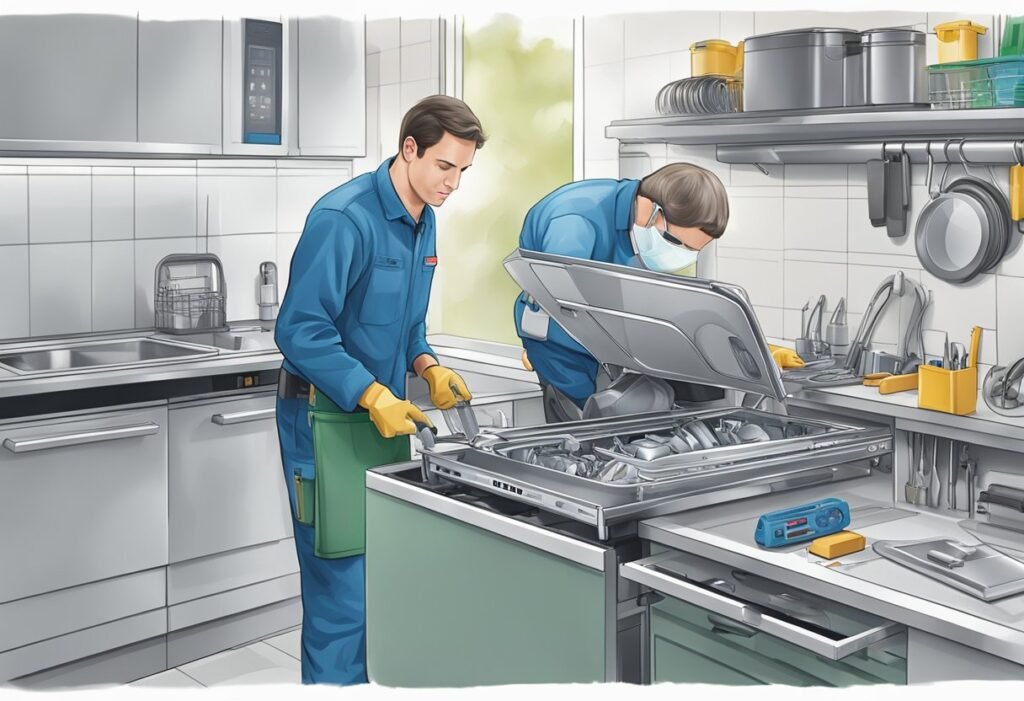
When your Bosch dishwasher shows signs of trouble, effective troubleshooting can help pinpoint issues quickly. Understanding error codes, performing manual inspections, and conducting electrical diagnostics are critical steps to get your appliance back on track.
Error Codes Interpretation
Bosch dishwashers have specific error codes that indicate particular problems. Refer to your user manual or online resources for a detailed list of codes. Here are some common codes and what they mean:
| Error Code | Description |
|---|---|
| E01 | Heating element failure |
| E15 | Water leakage detected |
| E24 | Clogged filter or drain issues |
When you see an error code, write it down and investigate further using available resources. Each code guides you toward a more specific problem, enabling you to resolve the issue efficiently.
Manual Inspection Techniques
Before diving into repairs, start with a manual inspection. Focus on these areas:
- Door Seal: Check for wear or damage as a compromised seal can lead to leaks.
- Filters: Remove and clean the filters to ensure water drains properly. Clogs can impact performance.
- Spray Arms: Inspect the spray arms for blockages. Ensure they are free to rotate and spray.
Look for any visible signs of wear or buildup. A thorough manual inspection often highlights issues that can be fixed easily without professional help.
Electrical Diagnostics
If errors persist after inspections, electrical diagnostics may be needed. Here are steps to follow:
- Power Supply: Ensure the dishwasher is plugged in and that the outlet works.
- Circuit Breaker: Check the circuit breaker to confirm that it hasn’t tripped.
- Wiring Assessment: Inspect the wiring for visible damage or loose connections.
Using a multimeter can help test voltage levels in components. Only proceed if you have experience with electrical repairs, as incorrect handling can be dangerous.
Maintenance Tips
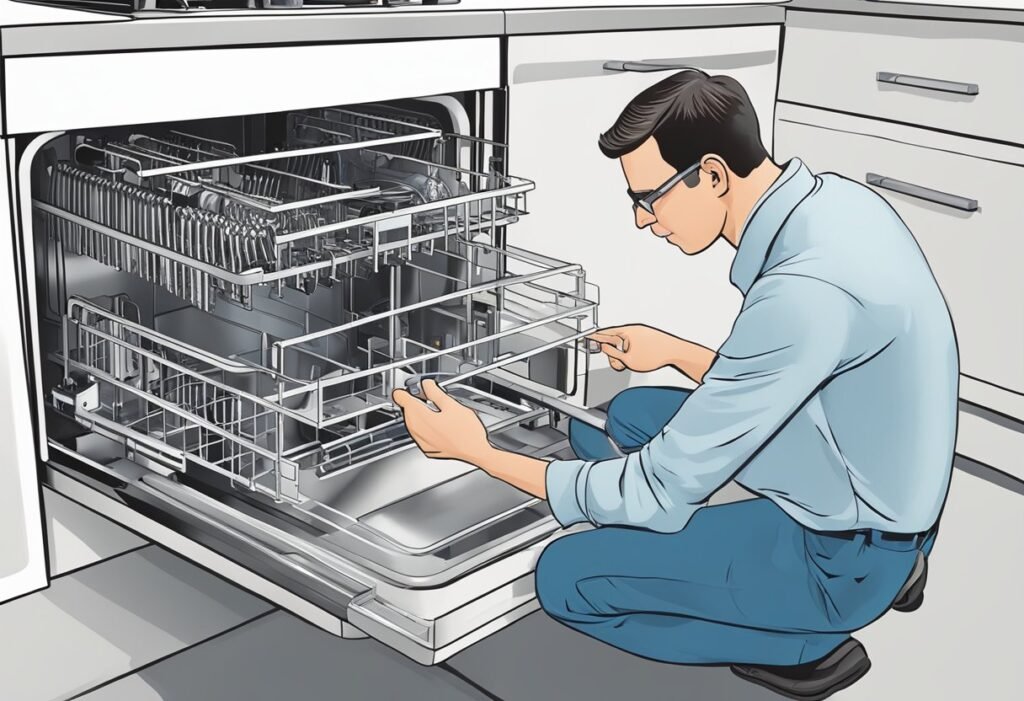
Proper maintenance of your Bosch dishwasher helps ensure it runs efficiently and lasts longer. By following some simple practices, you can prevent many common issues and enhance its performance.
Regular Cleaning and Care
To maintain your Bosch dishwasher, regular cleaning is essential. Start by wiping down the exterior with a damp cloth to remove any spots or stains.
Inside, check the door seals for debris. Wipe them clean to prevent leaks.
Run a cleaning cycle every month using a dishwasher cleaner. This will help eliminate odors and build-up.
Make sure to clear any food particles or debris from the bottom of the tub. This ensures proper drainage and prevents clogs.
Avoid using abrasive cleaners as they can damage the interior surfaces. Regular care contributes to a better cleaning performance over time.
Filter Maintenance
The filter in your Bosch dishwasher traps food particles to keep water clean. Check it regularly, ideally every month, and clean it to maintain efficiency.
To clean the filter, remove it according to your user manual. Rinse it under running water to remove any stuck debris.
If the filter is heavily soiled, use a soft brush for a more thorough clean.
Replace the filter properly to ensure it fits snugly in place. A clogged filter can lead to poor cleaning results and even flooding.
Regular filter maintenance helps keep your dishwasher running smoothly and efficiently.
Water Softening and Rinse Aids
Hard water can create limescale build-up in your Bosch dishwasher. To combat this, consider using a water softener. This will help prevent mineral deposits from affecting performance.
Using rinse aids can also improve drying performance. Rinse aids help water slide off dishes, preventing spots and streaks.
Fill the rinse aid dispenser as needed, typically every month, depending on usage. You’ll notice cleaner, drier dishes with their use.
Check your user manual for specific recommendations on water hardness settings and rinse aid usage tailored for your model. Proper use of these aids ensures that your dishwasher operates at its best.
Repair and Replacement
If you are experiencing issues with your Bosch dishwasher, understanding DIY repair options and knowing when to seek professional help can save time and money. Here’s a look at practical solutions, parts that may need replacing, and when to call in an expert.
DIY Repair Solutions
When your Bosch dishwasher shows problems, some issues can often be resolved with simple DIY methods. Start by checking the power supply. Ensure the dishwasher is plugged in and the circuit breaker is not tripped.
Next, inspect the door latch. If it’s not closing properly due to debris, clean around the edges to ensure it seals tightly. You can try resetting the dishwasher by turning it off for a few minutes.
For common problems like water not draining, check the filter for clogs. Clean it, along with the drain hose, to allow proper flow. You can usually find guides online for specific models that provide troubleshooting steps for various issues.
Parts to Consider Replacing
Sometimes, repairs require replacing specific parts to restore functionality. Here are some common components to consider:
- Door Seal: A damaged seal can lead to leaks. Replacing it ensures the door closes tightly.
- Dishwasher Filter: A clogged filter can prevent effective cleaning. If it’s worn out, a new filter can improve performance.
- Pump: If you notice strange noises or water isn’t draining, the pump may need replacing.
- Spray Arms: Cracks or clogs can hinder cleaning ability. Ensure they spin freely and replace them if necessary.
These parts can often be found at appliance stores or online retailers. Be sure to have your Bosch dishwasher model number ready when ordering.
When to Seek Professional Help
While many dishwasher problems can be tackled on your own, some issues require the expertise of a professional. If you’ve checked the basics and your dishwasher still won’t start, it could be a sign of electrical issues.
Additionally, if you notice persistent leaks or problems with the control panel, it’s time to call a repair service. Bosch customer support can guide you, and you may locate an authorized service provider through their repair page.
Timely intervention can prevent further damage, ensuring your dishwasher operates effectively without costly repairs later.
Warranty and Support
Knowing your dishwasher’s warranty and how to access customer support can save you time and money. Bosch offers reliable services to help you get the most out of your appliance.
Understanding Your Warranty
Your Bosch dishwasher typically comes with a limited warranty that lasts one year from the date of purchase. This warranty covers parts and labor for repairs on defects in materials or workmanship.
It’s important to keep your purchase receipt and any warranty information in a safe place. If a part fails due to a manufacturing issue, Bosch will replace it at no cost to you. However, damage caused by misuse or normal wear and tear is not covered.
Extended warranties may also be available for an additional fee. Review any options carefully and understand what is included to make the best choice for your needs.
Accessing Customer Support
If you experience issues with your Bosch dishwasher, accessing customer support is straightforward. You can call Bosch Customer Service at 1-800-944-2904. Their US-based team is available 24/7 to assist you with troubleshooting or repairs.
Alternatively, you can visit the Bosch support page for assistance. Here, you will find valuable resources such as guides and FAQs. You also have the option to chat online with a customer support representative for quick solutions.
Make sure to have your model number and purchase details ready when you contact support to expedite the process.
Frequently Asked Questions
If you’re experiencing problems with your Bosch dishwasher, it’s important to know what to look for. Here are answers to some common questions that can help you resolve issues quickly.
Why is my Bosch dishwasher not starting?
There are several reasons why your dishwasher might not start. Check that the door is completely closed and that the control panel is functioning. Ensure that the dishwasher is plugged in and that the circuit breaker hasn’t tripped.
What do the error symbols on my Bosch dishwasher indicate?
Error symbols on your Bosch dishwasher provide clues to specific issues. Each symbol corresponds to a different problem, such as a water supply issue or a drainage error. Consult your user manual to decode these symbols accurately.
How can I troubleshoot a Bosch dishwasher that is not draining?
If your dishwasher isn’t draining, start by checking for clogs in the filter or drain hose. Inspect the pump for any blockages as well. If those are clear, the issue may be with the pump itself or the control board.
Are there any common issues that lead to Bosch dishwashers being recalled?
Bosch dishwashers can be recalled due to problems with electrical components or fire hazards. Always register your appliance and stay informed about recalls through the Bosch website to ensure safety.
What is the average lifespan of a Bosch dishwasher?
The average lifespan of a Bosch dishwasher is about 10 to 15 years. Regular maintenance and proper use can help extend its life. Pay attention to any unusual noises or performance changes as these can indicate problems.
Where can I find the troubleshooting manual for my Bosch dishwasher?
You can find the troubleshooting manual for your Bosch dishwasher on the official Bosch website. Simply enter your model number in the support section to access the manual for detailed troubleshooting steps.
Bottom Line
When it comes to Bosch dishwashers, you might face several common problems. Being aware of these issues can help you troubleshoot effectively.
Common Problems:
- Not Draining Properly: Water remaining in the bottom could indicate a blockage.
- Water Not Filling Up: This may point to issues with the water supply.
- Not Drying Dishes: Poor drying could be caused by a clogged filter or heating element failure.
For specific troubleshooting, refer to Bosch’s troubleshooting and repair resources. You can also find tips for fixing issues like draining problems or water filling concerns.
If you’re still having trouble, contacting Bosch Customer Service at 1-800-944-2904 is an option. They provide assistance around the clock to help you resolve your issues.
Most Bosch dishwashers last between 10-12 years with regular maintenance. Simple checks on filters and spray arms can extend their lifespan. Regular maintenance can prevent many common problems from becoming severe.
Knowing these potential issues prepares you for quick fixes or informed discussions with service experts.

